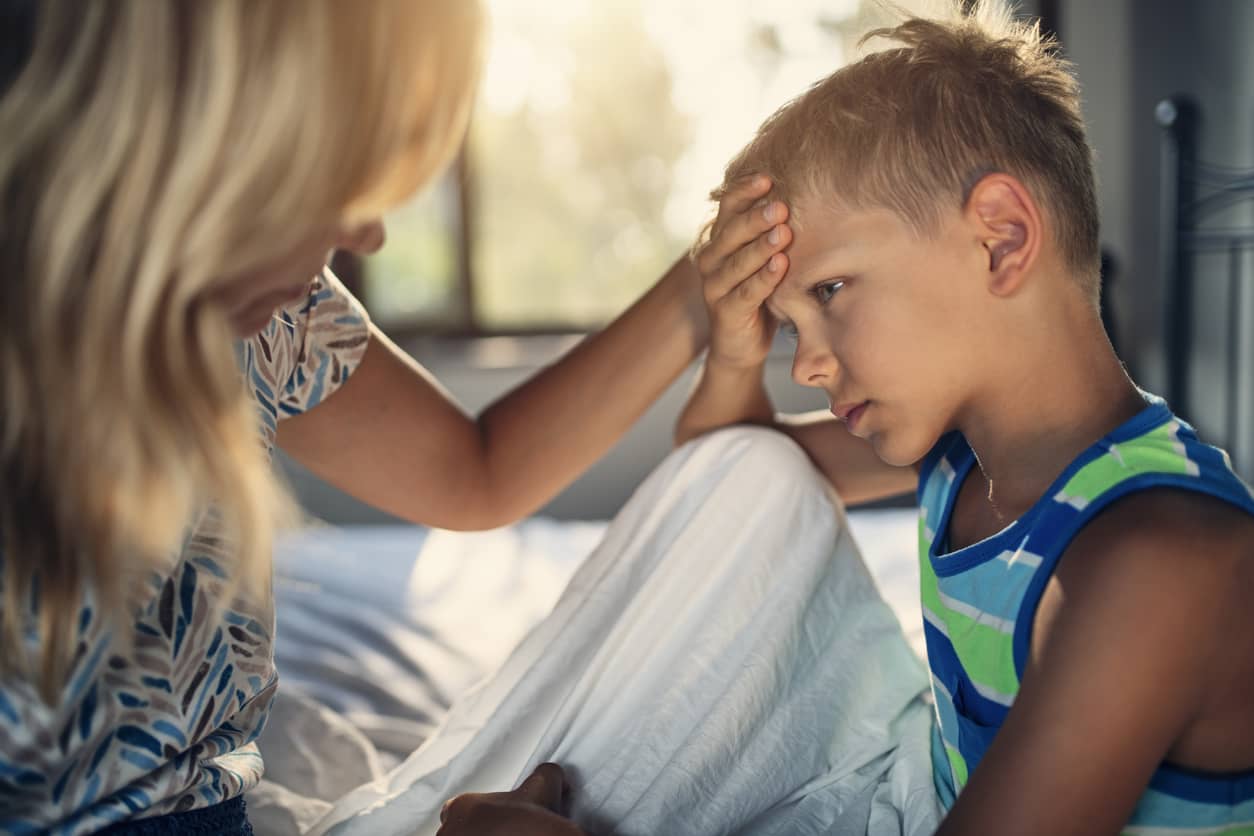When my son was around nine, I moved in with my current husband. His two kids were with us two days a week and every other weekend. (Yes, we were now a blended family.) My son, who was living with his dad, was with us on the corresponding weekends. He loved his stepbrother dearly; they were instant and close friends from the start.
I still don't know what prompted it, but one day they got into an altercation, and my son stomped on his stepbrother’s neck. I was in shock and disbelief. My emotions raged, every cell on high alert. Once I knew my stepson was ok, I swept my son outside and around the block for a walk. Again, I was incredulous, “What were you thinking? How could you do that?” He started sobbing, "Why did you have to move away?"
He started sobbing, "Why did you have to move away?"
We stopped walking, and I held him tight. My anger and fear turned to empathy and sadness. It was then that I understood he was carrying more unresolved pain and stress from the divorce than he was letting on. I also realized that he had trouble regulating his emotions.
I wouldn't say I acted any better in this situation. My son’s actions triggered my outburst, and none of it was productive. Had I been able to regulate myself, I could have responded instead of reacting.
Emotional regulation skills are essential for children to learn and develop. When a child can cope with stress, anger, frustration, and disappointment, they do better in school, in relationships, and at home.
Related reading: "Positive Parenting: 3 Parenting Strategies for Greater Patience."
What Is Emotional Regulation?
Self-regulation is the ability to stay calm, cope with big emotions, then adapt and respond appropriately.
From ages 0-6, children experience emotions freely and unencumbered, which can also mean experiencing big emotions. As parents, it's our job to teach children how to identify what they are feeling and then learn ways to express these emotions appropriately. At this stage, the primary emotions a child feels are mad, sad, glad, hurt, and scared. However, when overwhelmed, these emotions can get the better of them.
Often, this overwhelm can cause a child to dysregulate or act out. But it's essential to pay attention to what is really happening underneath their behavior and respond effectively.
A child can't learn emotional modulation through punishment; these behavioral outbursts are the time when conscious parenting is most needed. When we react harshly, shame, or punish, it can increase the “misbehavior,” whereas staying calm, coping effectively, and adapting to the situation feels good to children, and they generally become more cooperative and regulate with our loving assistance.
Related listening: “Name It to Tame It!” by Dr. Daniel Siegel
Emotional modulation is a skill that you can teach. It's all part of a child's emotional development. Rather than avoiding situations that may trigger your child, think of them as opportunities to coach them through challenging times. Clinicians call it “scaffolding,”; guiding them through the behavior you want to encourage.
Each time an opportunity presents itself, think of it as helping them to learn emotional regulation until they can regulate themselves.

The Power of Modeling
One of the most critical ways in which children learn to regulate their emotions is by watching you. When stressful situations occur, take time to self-calm to avoid having an emotional reaction. Modeling self-calming and self-care encourages children to do the same.
When children act out, they are typically in survival mode so they usually can't respond to logic or reason. During these times, children will respond better if you stay calm, show empathy, help guide them through sensory experiences and give them calming strategies. Approach the situation calmly in a nonjudgmental way.
This response isn't to say you don't need to set boundaries for their behavior but understand that you can't put limits on their feelings. Keep the focus on accepting their emotions and helping them learn to cope with their feelings.
Kids can get dysregulated when they need to express emotions and they can't or are not allowed. In turn, they act it out. Helping them feel cared about, valued, and understood as they learn will go a long way to building life skills.
Related reading: "How to Stay Calm Under Pressure!"
Ways for a Parent to Assist a Child in Learning Self-Regulation Skills
There are proactive ways to help your child practice emotional regulation.
First, children need to feel energized and good about themselves to be able to shift when they feel overwhelmed. Increasing activities that your child enjoys is one way to increase these feelings. Give them opportunities to experience joy, success, and pride.
Secondly, good sleep, a healthy diet, and regular exercise are also crucial in helping them regulate their emotions.
And finally, be sure to review their schedules and make sure they aren't becoming overloaded.

When emotional situations do arise, help your child identify ways they can remain calm:
- Take a mental break and do something creative, play a game or watch a movie.
- Get moving! Dancing, walking, hiking, or playing sports are all good ways to expend energy and increase dopamine.
- Spiritual practices such as yoga or meditation can be helpful.
- Find a soothing sensory experience. Touch something soft, taste something familiar, listen to the sounds around you. Engaging in a sensory experience redirects the child’s attention and helps to slow the emotions.
- Do a grounding activity such as deep breathing or pretending to be a towering oak with deep roots in the ground.
- Be affirming; kids respond better when they feel validated.
- Encourage social support, connecting with a parent, friend, or teacher.
Just as you help them learn how to walk, feed and clothe themselves, teaching our children emotional regulation is just as important.
If you are interested in learning more about emotional regulation, check out Why Should You Care About Emotional Regulation?

.png?width=225&name=Kali%20Gallette%20Headshot%20cropped%20(2).png)






